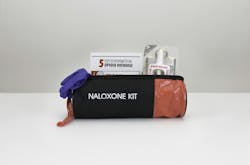With the FDA's approval of naloxone as an OTC drug, workplaces now have access to a lifesaving tool. and therefore, it should be included in workplace first aid kits, says the International Safety Equipment Association (ISEA). ISEA publishes the ANSI/ISEA Z308.1-2021 standard.
According to the U.S. Bureau of Labor Statistics, 525 people died from overdoses at work in 2022 .
In a March 2024 statement, the White House challenged leaders to increase training and access to opioid overdose reversal medications, keeping the medications in first aid kits, and distributing the medications to employees and customers so they might save a life at home, work, or in their communities.
This guidance does not appear in the current ANSI/ISEA Z308.1 standard because it was revised before the FDA approved naloxone. While a new update to ANSI/ISEA Z308.1 is planned for 2025, ISEA urges workplaces to add naloxone to their first aid kits now rather than wait for new guidelines.
"We all have a role to play in addressing the opioid epidemic, including employers," said Cam Mackey,
CEO of ISEA., in a statement. “Providing access to naloxone and appropriate training at work can protect workers and possibly save someone's life. We encourage all employers to make this change to their first aid kits now.”
The opioid epidemic has a significant impact on the labor market. An estimated 12.6% of the U.S. workforce receives an opioid prescription each year, and 75% of employers surveyed by the National Safety Council report that they have been directly affected by opioids.
Some companies and communities are already combatting opioid overdoses by making naloxone available and committing to more training. For example, the Chicago Department of Aviation added Narcan to 96 automated external defibrillator (AED) cabinets at O’Hare International Airport and 32 at Midway International Airport. Also, state health officials in California have pushed to expand access to the medication, distributing millions of kits for free.
In opioid overdose emergencies, bystanders are often the first to witness or be in the presence of the person experiencing an overdose. Individuals should not be reluctant to come to the aid of others out of fear of potential litigation. According to NSC, 49 states and the District of Columbia have enacted laws that provide legal protection to individuals who administer naloxone in good faith to someone experiencing an opioid overdose.
About the Author
EHS Today Staff
EHS Today's editorial staff includes:
Dave Blanchard, Editor-in-Chief: During his career Dave has led the editorial management of many of Endeavor Business Media's best-known brands, including IndustryWeek, EHS Today, Material Handling & Logistics, Logistics Today, Supply Chain Technology News, and Business Finance. In addition, he serves as senior content director of the annual Safety Leadership Conference. With over 30 years of B2B media experience, Dave literally wrote the book on supply chain management, Supply Chain Management Best Practices (John Wiley & Sons, 2021), which has been translated into several languages and is currently in its third edition. He is a frequent speaker and moderator at major trade shows and conferences, and has won numerous awards for writing and editing. He is a voting member of the jury of the Logistics Hall of Fame, and is a graduate of Northern Illinois University.
Adrienne Selko, Senior Editor: In addition to her roles with EHS Today and the Safety Leadership Conference, Adrienne is also a senior editor at IndustryWeek and has written about many topics, with her current focus on workforce development strategies. She is also a senior editor at Material Handling & Logistics. Previously she was in corporate communications at a medical manufacturing company as well as a large regional bank. She is the author of Do I Have to Wear Garlic Around My Neck?, which made the Cleveland Plain Dealer's best sellers list.
Nicole Stempak, Managing Editor: Nicole Stempak is managing editor of EHS Today and conference content manager of the Safety Leadership Conference.
